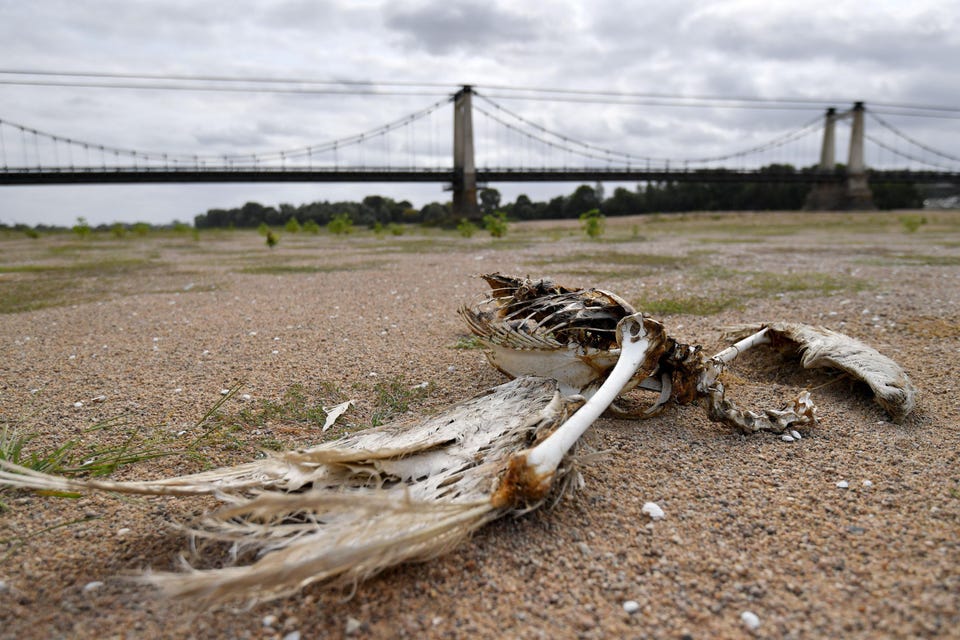Hedge Funds & Private Equity Do Record Temperatures Mean That Climate Damage Is Irreversible? Mike O’Sullivan Senior Contributor Opinions expressed by Forbes Contributors are their own. I cover the economic and financial world outside the USA, for the USA. New! Follow this author to stay notified about their latest stories.
Got it! Aug 13, 2022, 04:21am EDT | New! Click on the conversation bubble to join the conversation Got it! Share to Facebook Share to Twitter Share to Linkedin A picture taken on September 7, 2017 in Montjean-sur-Loire, western France, shows a Crane bird . . .
[+] skeleton lying on the dry river bed of the Loire. (Photo by LOIC VENANCE / AFP) (Photo credit should read LOIC VENANCE/AFP via Getty Images) AFP via Getty Images Ireland is in a crisis. Temperatures have recently hit all-time highs and oddly persisted so that unusually, people enjoy weeklong stretches of warmth and blue skies without the punctuation of rainy showers.
This has understandably bred some confusion. Extreme temperatures in Ireland need to be considered relative to our geography – the recent peak of 33C was the highest since 1887 – a time when Oscar Wilde was writing plays and perhaps, the first inklings of ‘Dracula’ came into Bram Stoker’s head. Yet, the rest of the world might regard our ‘sub – 30’s heatwave’ as a luxury – in a week when the Rhine and Loire ran dry, the Lee and Shannon brim onwards.
By comparison, Britain has fared less well, with large tracts of land scorched and temperatures pushing into the high thirties. Interestingly, for those who care about the climate, the Met Office’s Hadley Centre keep an excellent database on temperatures, going well back in history to 1659, which permits fascinating comparisons of temperature with historical events. The series unambiguously shows the recent decade has been the hottest in history, what looks like a trend departure in climate dynamics.
The Hadley database shows that recent temperature highs in Britain have only been seen in 1990 (briefly), and 1911. 1911 was interesting in that like today it was a time of great political volatility. Secession and independence were prominent issues (Ireland then, as with Taiwan and Ukraine today) and the path toward a great war was materializing (Germany and Britain then, China and the US now), and public unrest was common (between 1911 to 1914).
Additionally, as we have stressed on many occasions, globalization was coming asunder then, as it is now. Whilst, I am not sure that climate change played a role in the fall of 19/20 th century version of globalization, but it surely will in the 21 st century. Rebellion MORE FOR YOU The $30 Billion Kitty: Meet The Investor Who Made A Fortune On Pet Food Chairman Xi, China’s Looming Crisis, And The Myth Of Infallibility Meet Private Equity’s Quiet Corporate Turnaround Artist What might be a more interesting proposition is whether climate impacts politics.
In 1911, the close confines of the Westminster chamber meant that in the context of record heat, members of parliament became raucous, smelly and rebellious. This was mirrored across the country, and a warship was sent up the Mersey to protect food supplies. Another obvious coincidence of politics and climate stress was the ‘Winter of Discontent’ when in the context of food shortages, ferociously cold weather and a lorry driver strike, Jim Callaghan’s return from the warmth of the Caribbean kickstarted a political crisis that led to his demise ( Crisis, What Crisis ?).
With French and German electricity prices spiking to stratospheric levels, and Olaf Scholz pronouncing that it is unlikely that food and energy shortages in Germany will produce unrest, we can expect to see just that in Germany this winter. There are other ways in which climate and our experience of it feed back onto our political behaviour. In the United States, despite rigorous research by a dozen federal bodies to the effect that this period is now the warmest in the history of modern civilization owing principally to greenhouse gases, many Americans are skeptical that climate change is man-made.
Denial For instance, only 30 percent of Republican voters believe that climate change is driven by human activity, yet academic research has shown that among Republican voters, there is a significant degree of difference of opinion on climate change. For example, Republicans living in coastal areas—in California and Florida, for instance, two states where climate change is increasingly evident—have a much higher than average (compared to other Republicans) sense that climate change is ongoing. Having noted this, it still doesn’t make sense to wait until the earth is entirely parched to convince people of the need for action on climate change.
In this respect the passing of climate legislation in the US is welcome, though a preoccupation for many governments will be less staving off climate damage but rather limiting its economic impact for fear of the socio-political effects that this may have. In a week when British newspapers talked of 5,000 GBP annual fuel bills, it is noticeable that the UK is the one country in Europe (Estonia also) where the burden of the rise in the cost of living is far greater for lower income households than wealthier ones. The final link between climate change and politics that needs to be stressed is that at a time when the level and rate of climate damage have stepped up and are beginning to render parts of the world uninhabitable (the 2022 World Cup will be an homage to this), there needs to be close cooperation between the major regions, governments, large cities and corporations.
As we noted last week, a ‘Schism’ is developing between the large regions and this fracturing is now impacting corporate investment (China’s largest companies have announced that they will delist from the US stock market). Climate is becoming weaponized. Mike O’Sullivan Editorial Standards Print Reprints & Permissions.
From: forbes
URL: https://www.forbes.com/sites/mikeosullivan/2022/08/13/do-record-temperatures-mean-that-climate-damage-is-irreversible/



